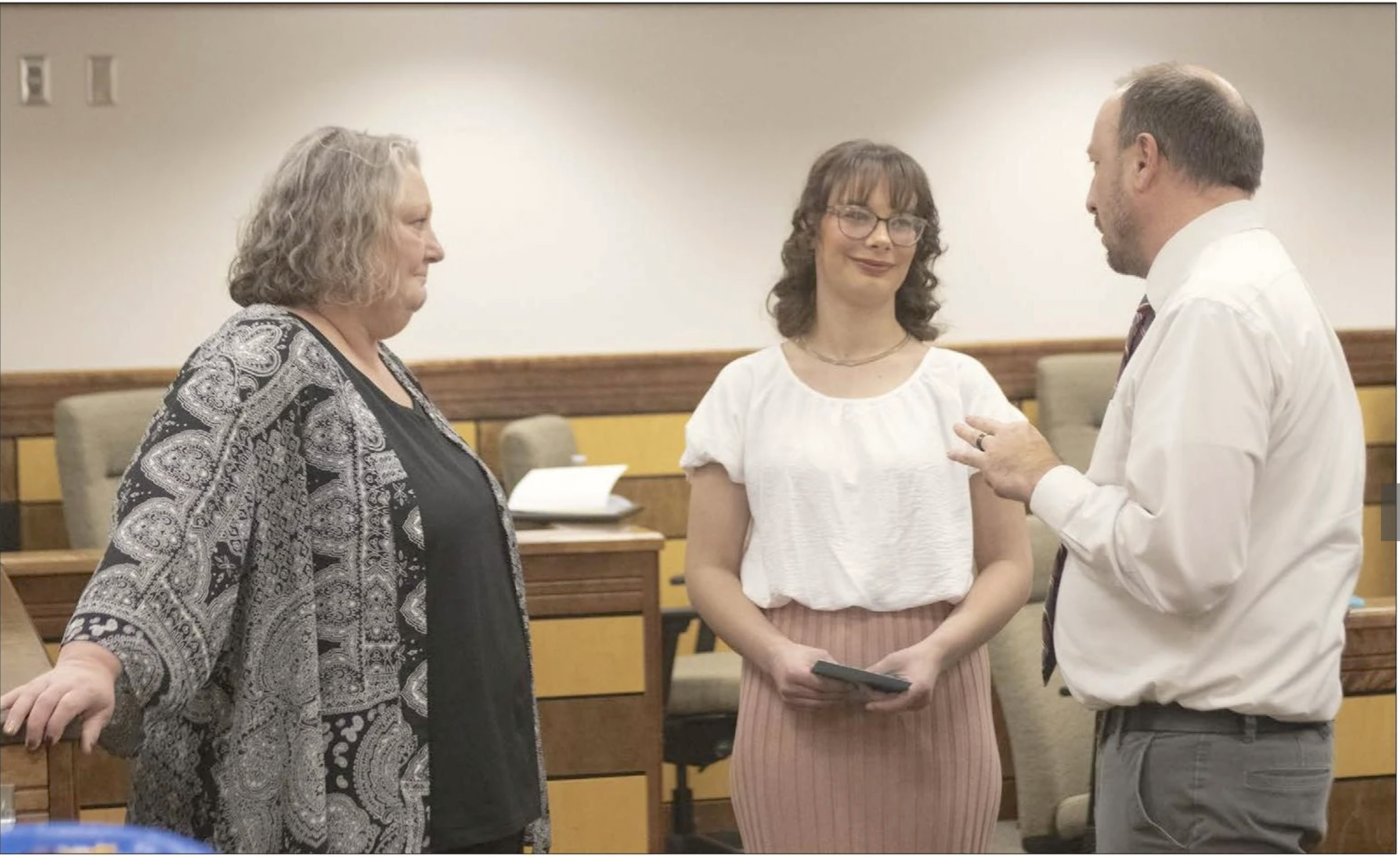‘A shoulder to lean on’ — Gillette teen graduates from drug court program, learns she doesn’t have to go through life alone

Sophiya Golightly, center, talks with J.R. Bailey and Kim Hoff, members of the Juvenile and Family Drug Court team, after Golightly’s graduation from the program. Golightly, 18, completed the program in less than six months and said it taught her how to rely on other people. Photo by Jonathan Gallardo, Gillette News Record.
GILLETTE — On the outside, Sophiya Golightly seemed to have it all put together. She was very active in her community, she had excellent grades, she was in the honors society, she participated in every club and team sport that she could.
But under the surface, Golightly was dealing with personal issues that she tried to solve with drugs and alcohol. She was addicted, she said, but she still kept up appearances.
And she relied on herself, not asking anyone else for help.
Then her life was uprooted, and she moved to Gillette. She thought a change of scenery might be good for her, but she fell back into old habits quickly.
She had a few weeks before classes started, so “all I did was get high and sleep.”
When school began, “it was hard for me to care about anything when I felt like no one cared about me,” she said.
Eventually she found a new group of friends to hang out with, but her addiction continued to spiral.
After getting charged twice for possession of alcohol, she realized that her decisions weren’t just affecting her own life. She was enabling others to go down the same path.
So Golightly decided to apply for Juvenile and Family Drug Court.
“I was nervous and upset that my life had come to this point, but I can honestly say it’s one of the best things that has happened to me,” she said.
Wednesday afternoon, Golightly, 18, graduated from the program, less than six months after she began.
It’s a voluntary program that requires participants to attend weekly court sessions, individual mental health counseling and group and individual substance abuse treatment. They’re on intensive supervised probation and must undergo frequent and random testing. Parental involvement is encouraged, and in some cases may be required.
There are immediate sanctions for violations and incentives for successes.
Golightly started using when she was 13 years old.
She lived with an older cousin who introduced her to it, and it soon became part of her life. She thought partying was just part of the high school experience, but she didn’t realize until later that she was using drugs and alcohol as a way of escape.
“That’s what’s tricky about addiction. We can look to those things that are still going well, just off of natural ability or luck, and say it’s not a problem,” said J.R. Bailey, the program’s probation officer.
Golightly said she comes “from a family of addicts,” and that was one of her excuses whenever she would drink or use drugs.
“Before, I’d kind of justify it, and be like, it’s just weed. My parents do a lot worse things,” she said.
She soon realized that she could get through her struggles sober, something she never thought she’d be able to do. Golightly completed the program without a single sanction or failed drug test.
But that doesn’t mean she got through without any struggles. She recalls one day when she missed one of her appointments. She was crying when Bailey told her that if she worked with the drug court team, they could figure out a solution.
“I realized I hadn’t always leaned on people, and it was something I’d have to learn to do,” Golightly said. “Learning to trust the people on the team, that was the hardest part.”
Her 15-year-old brother, Foster, said she’s “come a long way from where she was and what she was doing.”
“She was a lot worse, about a lot of different things, especially the way she treated people, and since she’s gotten sober she’s definitely become more responsible, a lot nicer, to me,” he said.
Sophiya said that when she wasn’t sober, she sometimes felt guilty that she was letting down her younger siblings.
“It’s a good feeling, knowing I can be a good influence (now),” she said.
Golightly is currently studying criminal psychology at Gillette College and is on track to graduate in the fall of 2025, a semester early. She plans to get a four-year degree after that.
“I like knowing why people do things, and the logic behind it, so I’d like to be a therapist, be the one that goes into prisons, or be a victim advocate,” she said.
Now, thanks to Juvenile and Family Drug Court, she not only knows how to be assertive and how to set boundaries, but she also has built up a support team, a “shoulder to lean on and a rock to keep me accountable,” she said.
“I’m a little nervous,” Golightly said about finishing the program. “I got really used to having the routine and everything, but I’m really excited to see what will come.”
This story was published on December 10, 2024.








